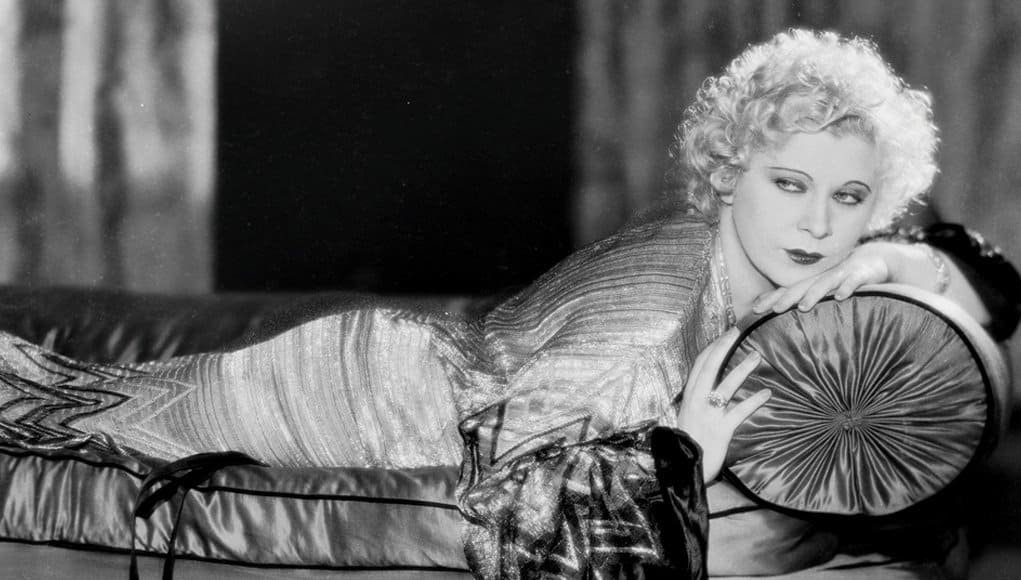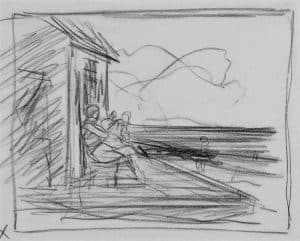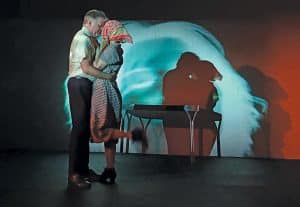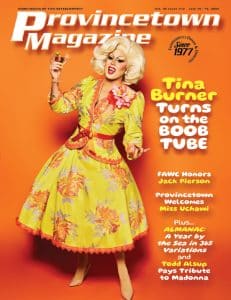The Legendary Mae West
by Rebecca M. Alvin
“One reason that I find Mae West so funny is she had an inherent sense of the ridiculousness of societal convention,” says Mitchell Polonsky of The Goat Exchange, an avant-garde theatrical troupe that will be performing West’s controversial 1926 comic play Sex (which she wrote and starred in) in this year’s Provincetown Tennessee Williams Theater Festival.
West is best known as the blonde bombshell comic actress of the 1930s who brought the art of the double entendre to new heights in films like I’m No Angel (1933), She Done Him Wrong (1933), and later with W.C. Fields in My Little Chickadee (1940). But West was much more than that. In fact, she didn’t begin her film career until she was 38 years old at which time she signed a contract with Paramount that not only made her the richest person in the United States next to newspaper mogul William Randolph Hearst, but also gave her that rarest of benefits in Hollywood at the time, the ability to write her own lines in the films she appeared in.
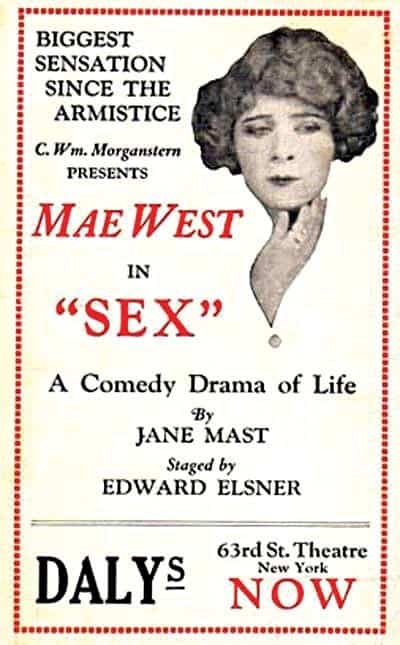
But in 1927, when she was still a vaudeville star and playwright who’d yet to break into the movie business, West was sentenced to 10 days in jail on obscenity charges when Sex was raided and shut down after a wildly successful 10-month run in New York City in 1926. In the court’s decision, it stated West “seemed to go to extremes in order to make the play as obscene and immoral as possible.” As so often is the case with censorship, the move backfired and West received an incredible boost to her notoriety, which in turn launched her film career.
The Festival’s theme this year is censorship, so artistic director David Kaplan came to the Goat Exchange with the idea of doing it. The group specializes in performing classic plays in new ways, incorporating immersive theater techniques, mixed media including film, dance, and other art forms, and bringing camp and comedy to more serious plays.The play centers on a Montreal prostitute named Margie who saves a high-society woman from a night of slumming with Margie’s pimp Rocky only to be thrown under the bus by the woman when the cops show up. Later their paths cross again just as Margie is considering going straight and living a normal life. It’s a comedy that, in typical Mae West style, questions gender roles and society’s absurd rules around sexuality, while also pointing out hypocrisy and classism, all wrapped up in humor and sexual innuendos that makes it fun and entertaining. Audiences then must have been stunned as there truly was no one like her.
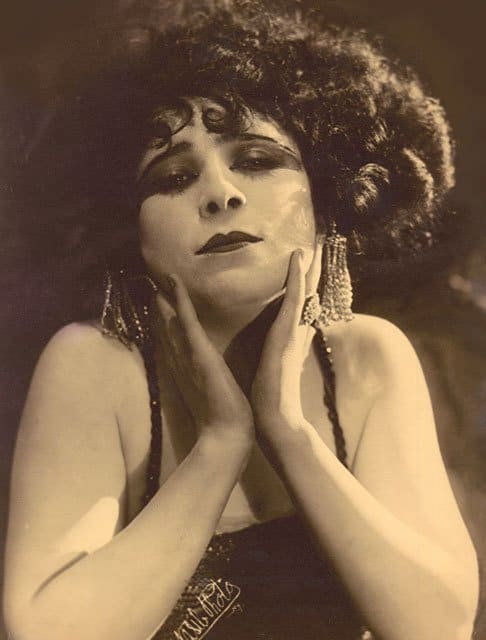
“When we look at classic plays, instead of trying to just bring them up to date by kind of glossing over the things that make them weird or difficult, or the complexities of a language that is removed from our own language, we really try to lean into the weirdness of that distance and bring up the humor in it,” explains Polonsky. “Instead of looking to find universal truth by sort of mashing up this with that, we really try to find the irony and humor in those differences, which is something that’s so much fun to do with Mae West. I mean I think she was already doing that in her present moment. So she had a kind of distance from her world already.”
Working with West’s material has been incredibly exciting for Polonsky as her sensibilities were so far ahead of her time that they actually match up well with how the troupe sees the material today. Her use of camp in a time before it became popular still resonates, as does the depth of her understanding of her characters’ performativity, adding a double layer of performance: the actors are performing as characters who are in a sense performing roles in their worlds.
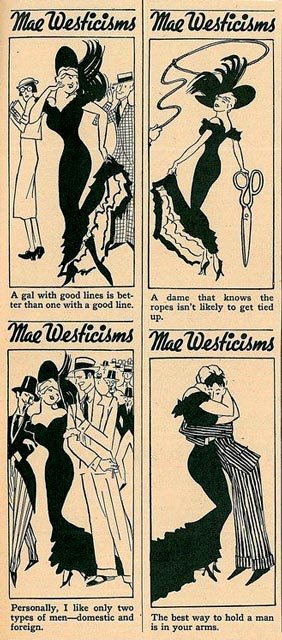
“Whenever she’s interacting with men she always, always, always knows what she’s doing. She always has the upper hand. And she always had an understanding of the way they see her, of her place in this world as a woman. But also she has a sort of a second sense, a heightened sense of what that means and she can almost see that from the outside. And I think one of the ways that we’ve tried to bring that out is we’ve been thinking of all of the characters as kind of drag characters, even when actors are playing characters of their own gender,” Polonsky explains. “We like trying to show the line between when they’re in drag and when they’re not in drag as sort of the fault line of that. So for Mae West, her character is sort of a camp drag version of Mae West, but you see the fault lines of that when you see her in the first scene getting dressed in drag and putting the wig on, and when she’s talking to Agnes, one of the other two main female characters in the play, it’s the only time she takes the wig and kind of drops the drag performance of Mae West.”
For this production, which is performed at the Boatslip, Polonsky says there will be a lot of pulling from the actual environment of Provincetown and Tea Dance in particular, incorporating elements of the space they’re in. “Mae West had an incredible sense of fun, so we’re trying to sort of create that kind of a atmosphere,” explains Polonsky. “There will be characters in and out of the pool, they’ll be moving around the Boatslip a little bit, and reducing that space to kind of create the whirlwind that is the play.”
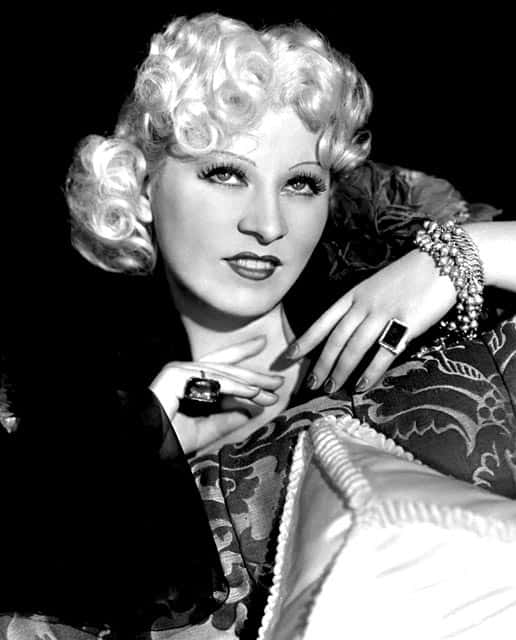
West also connects with the work of Tennessee Williams, who clearly pushed the envelope in his own way. Both worked with themes around sexuality and gender roles and the hypocrisies inherent in the social systems they were living in, both dared to step over the line between what was considered suitable for mass consumption and what might cause them to think beyond those narrow constrictions.
“I think Tennessee Williams’ characters also fall into the category of characters being what they are not. Susan Sontag also talks about them as always being ‘quotational,’ and I think that’s a similarity between Williams and Mae West. People naturally act in a kind of quotational way; I think we’re always quoting pop culture and the way that we think things should sound, and both of these writers had a really keen sense of the ways in which people are imitating other people around them,” Polonsky says.
Mae West’s Sex will be performed by The Goat Exchange as part of the Provincetown Tennessee Williams Theater Festival at the Boatslip, 161 Commercial St., on several dates during the festival September 22 – 26. For tickets and information call 866.789.TENN or visit twptown.org.

